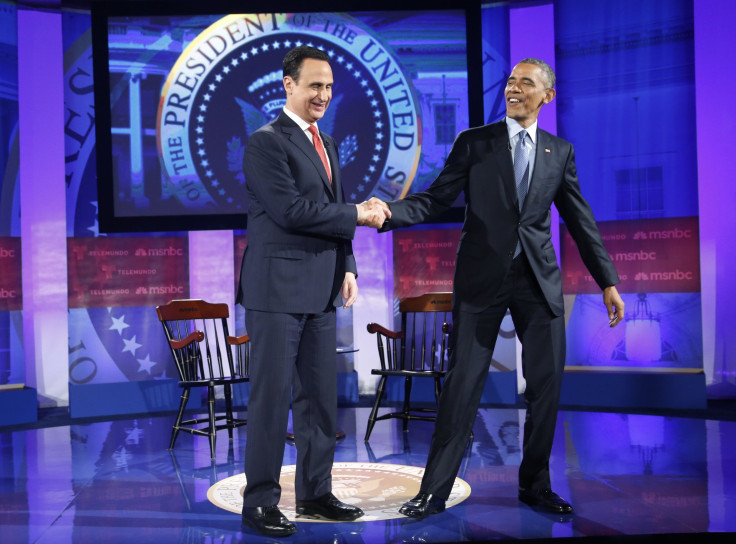
President Barack Obama reaffirmed last night that immigrants eligible for his deferred action programs will not be deported. That’s despite an injunction last week issued by District Judge Andrew Hanen, which bars the administration from giving those immigrants benefits such as work permits. Obama commented on this andother aspects of his immigration policy in a town-hall-style meeting in Miami on Feb. 25th, hosted by MSNBC’s José Díaz-Balart. One audience member, a veteran, asked if his undocumented mother was currently protected from deportation.
“Right now, the judge has blocked us initiating the program where [the veteran’s mother] can come and sign up and get registered. But in the meantime, part of the message that I’m sending is, if you qualified for the executive action that I put forward, then we’re still going to make sure that your mom is not prioritized in terms of enforcement. [...] So I just want to assure her, short term.”
As McConnell wrote in a recent op-ed for the Wall Street Journal, Hanen’s injunction bars the White House from executing programs that confer benefits. More than “signing up to get registered,” programs like DACA and DAPA (availible for certian types immigrants) would give millions of undocumented residents permission to work legally. That benefit -- the ability to work -- is the main legal problem identified in Hanen’s ruling because it’s considered a “benefit.”
At the Miami meeting, the President vowed to fight the ruling, as well as the initial injunction.
“The first step is to go before that same judge and say, ‘judge, what you said is wrong, rethink it.’ [Judge Hanen] may not agree with that,” said Obama on Wednesday. Hanen is highly unlikely to “rethink” his decision in which he reasoned that "there will be no effective way of putting the toothpaste back in the tube should the plaintiffs ultimately prevail." In other words, he was protecting the the status quo, in which DACA and DAPA eligible immigrants are not granted benefits.
“Ordinarily, a stay is designed to preserve the status quo while a case proceeds to a decision,” said McConnell, in an interview with the Latin Times. “[Hanen’s order itself was designed to preserve the status quo, on the grounds that it would be difficult -- maybe impossible -- to undo the effects of the executive programs once they are implemented.”
Barring a reversal from Hanen, deferred action advocates will have to wait for the case to work it’s way through the courts. They better not hold their breath, because benefits for new DACA/DAPA applicants could be delayed “forever,” according to conservative legal scholars. If true it would fly in the face of recent activist rhetoric which has calmly assured immigrants that Hanen’s ruling is only a “temporary setback” by an “activist” judge.
In contrast to the blind optimism of immigration organizers, conservatives have been licking their chops. That’s because Hanen’s ruling may have slowed down executive action enough to stop it until the next presidential election. In an interview with Fox News, Judge Andrew Napolitano said last week that the injunction could last “forever.”
“What do I mean by ‘forever?’ President Obama has only fewer than two years remaining in office, [and] it will take longer than two years to work it’s way through the courts,” said Napolitano.
McConnell, the former appellate judge, agreed that a two-year delay was a "reasonable estimate."
“That’s unless they ask for an expedited ruling in which case a verdict could be reached in 2-6 months. “It’s not impossible that this could be expedited as the result of a humanitarian emergency. [But,] if the government really wanted to move fast, they would have filed an appeal for an expedited decision already. They would have been prepared. Everyone know this order was going to come down.”
However, the White House has not applied for such a ruling. It has also been slow to submit paperwork for other legal options, such as the stay request, which took over one week to wander from the White House, to the Department of Justice, sitting for a few days before finally making it to Hanen, who is currently considering it. Whatever the White House’s reasoning, it appears that they’re hunkering down for a long appeals gauntlet, not a quick resolution.
“Of course we weren’t surprised,” said President Obama in Miami. “I’ve got a bunch of lawyers, we saw the judge who was rendering the opinion. The fact that we weren’t surprised doesn’t mean we can stop the judge from rendering an opinion. It means that we then go forward in the appeal process.”
As noted above by McConnell and Napoletano, the appeals process could drag out for two years. Even if the 5th Circuit resolves the issue in “six to eight months,” as one expert estimated, millions of undocumented immigrants may be stuck in limbo as it heads to the Supreme Court. Free from deportation but barred from protective status, many undocumented immigrants will stay in the shadows. President Obama was aware of the stalemate between the judiciary and the executive branches when he spoke in Miami, ultimately directing the conundrum back at Congress.
“But the one thing I do want to emphasize is that in order for [immigration reform] to be permanent [...], so that it doesn’t just last during my administration and then get reversed by the next President, [...] we’ve got to pass a bill.”
© 2025 Latin Times. All rights reserved. Do not reproduce without permission.



